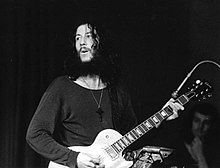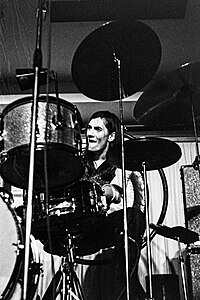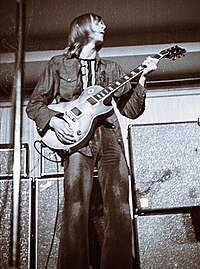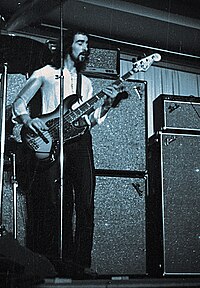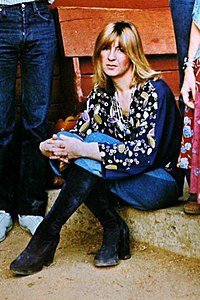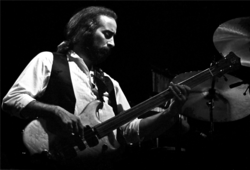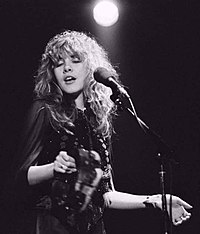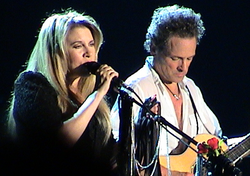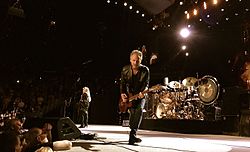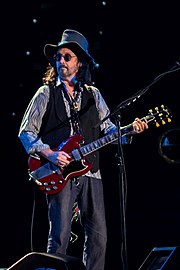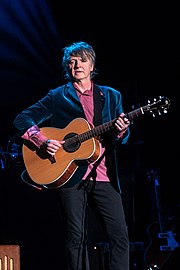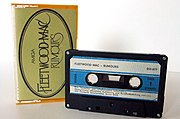Fleetwood Mac
Fleetwood Mac is a British rock band formed in London in 1967. Founded by Peter Green (vocals and guitar), their first line-up also included Jeremy Spencer (vocals, guitar, piano and slide), Mick Fleetwood (drums) and Bob Brunning (bass), although the latter was only around for the time John McVie was in John Mayall & the Bluesbreakers for contractual reasons. For their part, in 1968 they hired Danny Kirwan as the third guitarist. Together with Green, they published three studio albums, which positioned them as one of the most important groups of British blues.
In May 1970, Green left the band due to personal matters, and later that year, keyboardist/vocalist Christine McVie joined. In less than two years, their two remaining guitarists also left the band: first Spencer in 1971 and then Kirwan in 1972. Bob Welch was hired to fill Spencer's position, and Bob Weston and Dave Walker for Kirwan. However, the participation of the latter two lasted just over a year, since for different reasons both were fired. The departure of its three main composers meant that Christine McVie and Bob Welch were in charge of the composition of the three albums released in 1973 and 1974. Although they did not obtain the same commercial success as their predecessors, especially in the United Kingdom, This stage is considered the transition between the blues and blues rock sound of its beginnings and the pop rock that they later adopted.
In 1975 they hired guitarist Lindsey Buckingham and vocalist Stevie Nicks, whose influence turned the band's sound toward pop rock and soft rock. This brought them considerable commercial success thanks to the albums Fleetwood Mac (1975), Rumours (1977), Tusk (1979), >Mirage (1982) and Tango in the Night (1987). Without Buckingham, and with Rick Vito and Billy Burnette in his place, Behind the Mask was released in 1990, considered his least successful production in the last fifteen years. The following year, Nicks and Vito quit, and in 1995, along with vocalist Bekka Bramlett and guitarist Dave Mason, released Time (1995), which proved to be a commercial failure. After that, Christine announced the separation of the band.
In 1997, the late-'70s lineup reunited and recorded the live album The Dance (1998), but the following year Christine withdrew from the band and the music scene, from which she would stay away for several years. Its four remaining members recorded Say You Will in 2003. In the following years they toured constantly, releasing an EP in 2013 and in 2014 celebrating Christine's comeback with the On with the Show tour (2014-2015).). Despite the fact that the recording of a new album was speculated, internal problems once again played against it and, therefore, Buckingham and Christine ended up publishing an album as a duo in 2017. In 2018, Buckingham's dismissal was made public, who was replaced by Neil Finn and Mike Campbell.
Fleetwood Mac experienced a radical evolution in its musical style, since it was born as a blues band and, in less than a decade, became a pop rock band. >. Despite the constant change of musicians, it never lost its compositional quality nor its commercial success, except between 1971 and 1974, especially in the British market. With record sales that fluctuate between 100 and 120 million copies worldwide, she has been awarded by various music organizations, and has been included in the Hollywood Walk of Fame in 1979 and in the Rock and Roll Hall of Fame. in 1998. Likewise, it has inspired numerous musical artists; in fact, the stage with Green has notably influenced groups of blues rock, hard rock and heavy metal, while that of Buckingham and Nicks He has done it with pop rock, folk rock, alternative rock, independent and electronic music bands.
History
Origins
The origins of the band date back to April 19, 1967 when John Mayall gave guitarist Peter Green a recording session at Decca Studios in London. Along with the other members of John Mayall & the Bluesbreakers, drummer Mick Fleetwood and bassist John McVie, recorded four songs: "First Train Home", "Looking for Somebody", "No Place to Go" and the instrumental "Fleetwood Mac", named after their last names. last. After that, Green proposed to create a new band, Mick accepted because Mayall had recently fired him, while John was not sure since his contract with him was still valid. To start the project later, the guitarist placed an ad on Melody Maker was looking for a bass player to play for as long as John stayed with Mayall and so hired Bob Brunning. Also wanting a second guitarist, Mike Vernon—future producer of the debut album—showed him a demo of a group called the Levi Set Blues Band so he could hear the playing of Jeremy Spencer, who also played slide. i> and the piano. Impressed by his talent, Green signed him after attending a Levi Set concert in Birmingham on June 11. As Fleetwood Mac, the band debuted on August 14, 1967 at the British Jazz and Blues Festival, Windsor. In September, John McVie joined the group after resigning from the Bluesbreakers because he disagreed with Mayall about adding a horn section, which meant Brunning's departure.
1967-1969: First stint with Peter Green
On November 3, 1967, Fleetwood Mac released through Blue Horizon Records—Mike Vernon's label—their first single, "I Believe My Time Ain't Long." According to the producer, they had submitted the demo to Decca Records, but despite the fact that they did not reject it, there was no intention of releasing it either. Therefore, they signed with CBS, which in turn took over Blue Horizon. Recorded in 1967 at Decca and CBS studios in London, their debut album Fleetwood Mac (1968) included their own songs and covers of other artists, where Green and Spencer shared the work of vocalist. The album was a positive success in the United Kingdom, because it reached the fourth position in the UK Albums Chart and spent a total of thirty-seven weeks on the list. It also obtained a great reception in the musical charts of Norway and New Zealand, where it reached positions 3 and 4 respectively. However, in the United States it only reached number 198 on the Billboard 200. The success achieved in its own country the led to the issuance of two singles in the first half of 1968. Green's composition "Black Magic Woman" was released in April, while in July they released a cover of Little Willie John's "Need Your Love So Bad", the which stood out for including a section of winds suggest gone by Vernon. Both managed to enter the UK Singles Chart, in boxes 37 and 31 respectively.
In August 1968 they released Mr. Wonderful, which unlike its predecessor, was recorded live in the studio with miked amps and a PA system. Their second production featured keyboardist and future member Christine Perfect, then part from Chicken Shack. Despite being considered a "disappointment" by critics compared to the debut, Mr. Wonderful maintained the band's popularity in the Norwegian and British markets, reaching positions 8 and 10 on the respective charts. Around the same time, Green met the group Boilerhouse and with it the seventeen-year-old guitarist. Danny Kirwan. Impressed by his skills, Green invited them to open for Fleetwood Mac at live concerts and also wanted to empower them to become professionals. However, in the course of the other members of Boilerhouse quit, so Green hired Kirwan at the suggestion of Fleetwood and joined as third guitarist shortly after the release of Mr. Wonderful. With Kirwan's help, Green finished writing the single "Albatross", an ambient instrumental inspired by Santo & Johnny. Since Spencer was reluctant to collaborate on Green's compositions, he did not participate in its recording; yet he was on the cover.“Albatross” became his first continental hit, reaching number one in the Netherlands; it entered the top ten best-selling singles in Ireland, Norway and Switzerland; and entered the counts of Germany and Belgium. For its part, it reached first place in the United Kingdom, becoming the band's only number one in its own country. In addition, in April 1974, the Industry British Records Company (BPI) awarded it a silver record after selling more than 250,000 copies, establishing it as their first record label certification received in their country.
In January 1969, while in the United States, they performed a special session at Chess Records studios in Chicago together with American blues musicians, including Willie Dixon and Otis Spann. The result of these sessions was released at the end of the year on an album titled Fleetwood Mac in Chicago. Around the same time, they left Blue Horizon to sign with Immediate Records and in April released the single "Man of the World", which reached second place in the UK Singles Chart. This was their only release released with Immediate, as they soon filed for bankruptcy. Apple Records, The Beatles' label, was interested in them, also taking into account that Mick Fleetwood and George Harrison were in-laws. However, by decision of his manager, Clifford Davis, Fleetwood Mac signed a contract with Warner Bros. Records, which would publish his subsequent albums through its subsidiary Reprise. With the idea of promoting them in the US market —where they were unknown— In January the compilation English Rose was released, which included some tracks from Mr. Wonderful - work not released in the United States - "Albatross" and some songs written by Kirwan. However, the album had a poor reception in that market, since it only reached number 184 on the list Billboard 200. With a similar track listing, Blue Horizon released the UK compilation album The Pious Bird of Good Omen in August in the UK and reached number 18 on the national chart.
The first production with Reprise Records was released in September 1969 under the title Then Play On. While the record featured the band as a quintet, Spencer had virtually no involvement in its making, save for "some piano stuff" according to Fleetwood. For this work Green gave greater freedom to Kirwan, who composed seven of the fourteen songs, which he in turn sang. Then Play On entered the top ten best-selling albums on the UK charts. UK and Norway, and marked their German debut by peaking at number 90. Their promotional single, "Oh Well", achieved resounding success in Europe as it reached the top ten best-selling singles on various charts, notably first place in the Netherlands; his second number one in that country after "Albatross" in 1968. It also became his first single to chart on the Billboard Hot 100 in the United States at number 55.
1970-1973: Constant changes in the lineup
By 1970, internal problems began to appear, as manager Clifford Davis mentioned that in March Green had taken a heavy dose of LSD in Munich that led to schizophrenia and stated that he "never became the same". He changed his way of dressing, became more spiritual, and began to hate fame and money, to the point that he wanted to donate all the band's profits to charity, which sparked controversy with the other musicians. The guitarist recalled that he had a vision of an angel carrying a hungry child in his arms and mentioned that: «I thought he had too much money to be happy and normal. Thousands of pounds is just too much for a person who works just to support himself and suddenly I felt I didn't deserve it". While on tour in the United States they recorded the last single with Green, "The Green Manalishi", the lyrics of which are considered as a testimony of what the founder of the group was experiencing. After a concert that took place on May 28, 1970, Green left the band.
With the departure of the main songwriter, Kirwan and Spencer assumed creative control of the songs on the next album, titled Kiln House (1970). As Spencer had a greater involvement and was a follower of rock and roll, its sound was closer to rock, although it did not lose the essence of blues rock. During its recording, Christine Perfect —now named Christine McVie after she married John in 1969—she collaborated as backing vocalist and keyboardist and created the cover art, but was only credited for the latter. A month before the album's release, on August 19, Christine became an official member. by Fleetwood Mac. The change in sound for Kiln House helped Fleetwood Mac chart for the first time on Australia's Kent Music Report and Canada's RPM Top Albums charts, and also achieved their highest charting yet. then in the US Billboard 200 (box 69). In contrast, in Europe, it only entered the British count in position 39, the lowest since they debuted in 1968. In 1970, they bought the Benifold mansion in Hampshire (England) for 23,000 pounds, where they later lived with their partners: Mick and Jenny Boyd settled in the "spacious rooms of servants"; John and Christine, in a separate wing; and Danny and his girlfriend, Clare, in the penthouse. Jeremy, along with his wife and children, also lived in the building for some time. In Benifold they composed the material for their next albums, until they sold it in the middle of the decade once they settled in the United States.
In February 1971 they began a tour of the United States, but once they arrived in Los Angeles to play three nights at the Whiskey a Go Go, Spencer disappeared from the hotel where they were staying. After looking for him in the city, they discovered that he had joined the Niños de Dios religious group and did not want to return; Mcvie recalled that he "doesn't want to play anymore, just serve Jesus and God." Faced with their unexpected departure, they contacted Green, who met them on March 19 in San Bernardino to support them only until March 27, the last date of the tour. Judy Wong, a friend of the band, recommended her partner Bob Welch, who was living in Paris at the time and was a guitarist in the rock and soul group Head West. After a few meetings in Benifold, he was hired as rhythm guitarist. Compositions by Kirwan, Welch, and Christine made 1971's Future Games a departure from the Peter Green-era sound, as their result it was a clear move towards folk rock and pop. Although it did not achieve the same popularity as Kiln House, it outsold the first three albums in the United States. United Kingdom. However, the situation in the United Kingdom was very different, since Future Games managed to be the first of all the albums released between 1971 and 1974 not to enter the UK Albums Chart. The only exception was the November 1971 Greatest Hits compilation, which reached number 3 in February 1972.
For Bare Trees of March 1972, Danny Kirwan played a pivotal role in composing their songs—he wrote five of the ten—the result of which has been hailed as their "first consistent album", where they defined their post-blues sound. According to Rolling Stone magazine critic Bud Scoppa "it's [Kirwan's] presence that makes Fleetwood Mac something more than another competent rock group”. But unlike what happened in the studio, during the tour Kirwan began to have problems with the rest of the group. Backstage before a concert in the United States, he argued with Welch over the correct tuning of the guitars and reacted violently: he hit his head and fists against the wall, broke his Gibson Les Paul guitar, destroyed the dressing room and refused to go up to the scenery. After the group was able to perform the concert, he criticized them so badly that an angry Mick Fleetwood fired him. Mick later recounted that the pressure and stress of life as a professional musician worked against the guitarist and as As the Bare Trees tour progressed, he became more volatile, withdrawn and dependent on alcohol, but they, at the time, had no idea what was wrong with him. To fill his position, in September they hired guitarist Bob Weston and vocalist Dave Walker.
In early 1973, Christine and Welch composed the songs for Penguin, released in March. According to Allmusic's William Ruhlmann, all traces of blues rock are lost with this album due to Welch's "hypnotic melodies" and Christine's "romantic pop". Although both wrote material for Walker, he tended to to make the songs sound more like Savoy Brown - the band from which he came - than Fleetwood Mac. Because his voice did not fit with the sound of the group, in mid-1973 he was asked to resign. In October, they released Mystery to Me, which peaked at number 67 and spent a total of twenty-six weeks on the Billboard 200. This was due in large part to the song "Hypnotized", the high point of the album according to Allmusic, since it was constantly played on the radio. According to the writer Donald Brackett, the change in sound they made between 1972 and 1973 was more widely received by the American public because they were more open to listening to British groups, while in the United Kingdom they were still consuming blues rock. In that same year the McVie marriage was going through a critical moment due to John's alcoholism, which generated intense discussions within the band.
1974: The New Fleetwood Mac and the name dispute
In the middle of the US tour in support of Mystery to Me, Bob Weston had an affair with Mick Fleetwood's wife, Jenny; consequently, Fleetwood Mac's road manager John Courage fired him. The news left the drummer so devastated that he decided not to continue with the tour. In 1973, after performing in Lincoln, Nebraska, the band told a sound engineer that the entire tour was cancelled, with twenty-six dates still to go, and there were plans to break up. Clifford Davis was troubled by this decision because he was in trouble. compromises with the various agents, promoters, and consequently his reputation as manager. He scheduled a tour of the United States for early 1974 with the musicians from Legs—a group led by Davis—with the idea of covering the canceled dates. Named The New Fleetwood Mac, it included Elmer Gantry (voice), Kirby Gregory (guit arra), Paul Martinez (bass), David Wilkinson (keyboards) and Craig Collinge (drums). They were told that Mick would be on the tour and that he was behind the planning, but he dismissed such rumors in his autobiography of 2014. However, in 2017, Gantry and Gregory affirmed that there were meetings with him and they had even discussed the list of songs they would perform.
When the tour began on January 16, 1974 in Pittsburgh, there were problems with the concert promoter, who were unaware of the matter between Davis and the other members. The New Fleetwood Mac were able to play and unexpectedly part of the audience received them well, but the other part wanted a refund. The promoter, against Davis's advice, refunded their money and called the booking agency in New York to tell them that the Fleetwood Mac he played was not the real thing, but they did not believe him. For the presentation in that city, on January 26, the news of the "fake Fleetwood Mac" had spread and the promoters of the other cities did not agree with the tour. Although it was scheduled to run until February 27, it is not clear when it ended because many dates were cancelled; even in San José, California it was reported that the venue was half empty and the public was demanding the money back at the box office. Meanwhile, Welch convinced his colleagues that they could manage their careers themselves and should settle in the United States, while the lawsuit for the use of the name was being carried out in a court in that country.
For its part, in July 1974, a British court ruled that Davis could not use the name until its ownership was proven and that they could write and record new recording material, but not perform live. As a result, they renegotiated their contract with Warner Bros. Records and in September they released Heroes Are Hard to Find as a quartet. This became their first production recorded in Los Angeles and is the one that reached the best position on the Billboard 200 until then, reaching number 34. In December 1974, Bob Welch retired on good terms and later began a solo career with the support of Seedy Management, the company created by John and Mick to manage the activities of Fleetwood Mac. On the other hand, the lawsuit ended in favor of the band and, depending on the source, it is mentioned that it lasted a year or two and a half years. musicians from The New Fleetwood Mac were renamed Stretch and continued under the direction of Clifford Davis.
1975-1979: Reformation and commercial success
One day, Mick was at Sound City studio in Los Angeles and told engineer Keith Olsen that they were looking for a new guitarist, so he played a tape of Buckingham Nicks' track "Frozen Love" for him. He was introduced to the work of American Lindsey Buckingham. As the guitarist was also in the studio, Mick persuaded him to join the band, Buckingham accepted, but on the condition that they also take in his girlfriend and singer Stevie Nicks. On New Year's Eve, the pair officially entered Fleetwood Mac. Within three months they recorded Fleetwood Mac (1975), where songs by Buckingham and Nicks transformed the band's identity, turning it into a Californian pop rock group and led Christine to write soft rock songs, according to critic Stephen Thomas Erlewine. At first it had a modest impact, until fifteen months later, in September 1976, arrived until It is at the top of the Billboard 200. Its singles: "Over My Head", "Rhiannon" and "Say You Love Me" entered the top twenty best sellers on the US chart. 1975 was certified gold by the Recording Industry Association of America (RIAA) and in 2018 it achieved a sevenfold platinum record, for selling more than seven million copies in the United States. For its part, the reception in its own country It was somewhat more reserved, since it reached 23rd place in the local count and it was not until 1978 that the BPI awarded it a gold record on behalf of 100,000 copies sold.
In contrast to the commercial success, the musicians were going through one of their worst moments: John and Christine's marriage had ended; Lindsey and Stevie's relationship was suffering from strains and Mick was in the process of divorcing his wife Jenny. In addition, the unexpected popularity and fortune, the constant concerts, the rumors from the tabloid press about their private lives and the pressure to release a new album that would match the success of the previous one, also accompanied by drug and alcohol abuse, generated a strong stress in the band. Tim Jonze of The Guardian mentioned that: "Where music was once an escape from the turmoil in the band, now drugs acted as an escape from the demands of the music".
Despite this, Fleetwood Mac put his professionalism to the test and with "tremendous emotional sacrifice" in Mick's words, in 1976 he began work on a production. Published February 1977, Rumours reached number one in the United States, Australia, Canada, the Netherlands, New Zealand and the United Kingdom, as well as entering other European charts. With gold, platinum and multi-platinum record certifications received in various countries, Rumours is one of the best-selling music albums in history, since by 2020 it was estimated to have sold more than 45 million copies worldwide. In 2014, the RIAA awarded it a double diamond disc representing 20 million copies sold only in the United States. For its part, its four promotional singles —"Go Your Own Way", "Dreams", "Don't Stop" and "You Make Loving Fun"—entered the top ten best sellers on the Billboard Hot 100, of which "Dr. eams" reached first place. The album was also well received by the specialized press, for example at the 20th Grammy Awards ceremony Fleetwood Mac together with producers Ken Caillat and Richard Dashut won in the album category of the year.
In the 1977 annual count, both the band and Rumours managed to be decorated by the main American magazines of the time. Billboard, Cashbox, Record World and Rolling Stone ranked Rumours as the album of the year. Billboard presented them with four Number One Awards for Album of the Year—mentioned above—Group of the Year, Pop Artist Album, and Pop Group Album. Cashbox ranked them at the top of their album and singles charts; Record World presented them with the Special Achievement Award, placing them No. 1 in the Vocal Combination category for both singles and albums. For their part, the readers of Rolling Stone awarded them artist of the year and "Dreams" single of the year. In addition, the critics of this last magazine named them the band of the year. For their part, Performance in 1977 called them the exceptional rock band and the trend-setting rock band.
After the successful promotional tour, Buckingham convinced the other musicians to record an album that was nothing like Rumours, since he didn't want to repeat the same formula. Mick decided to make it a double album and, after some differences with Warner Bros., they opted to create their own studio called Studio D to record it. Costing US$1 million to make—the most expensive album in the industry up to that time— Tusk (1979) has been widely regarded as Buckingham's work, as he wrote nine of the twenty tracks. Critic Stephen Holden of Rolling Stone magazine compared it with The White Album by The Beatles for the diversity of musical styles present, including rock, soft rock, pop rock i>, folk rock and art pop. On the other hand, it managed to be among the ten best-selling albums on various music charts, among them it reached the first place in the kingdom or United and fourth in the United States. Despite the fact that it is estimated to have sold more than four million copies and its visual concept even received a nomination for best packaging design at the 1981 Grammys, Warner Bros. considered Tusk a failure due to its poor sales compared to Rumours, as well as high production costs, and blamed Buckingham squarely. he mentioned that the label was responsible, since it established two unusual situations for any production from the late 1970s: it played the entire album on the radio and the price of US$16 was very high for the time.
1980-1989: Mirage, Tango in the Night and solo careers
With songs recorded during the Tusk promotional tour (1979-1980), in December 1980 they released their first live album entitled Live, which contained mostly the hits of their last three studio albums. Two months later, both the BPI and the RIAA certified it gold. For much of 1981, the band took a break, and Nicks, Buckingham, and Fleetwood took advantage of that time to begin their solo careers with the productions Bella Donna, Law and Order and The Visitor, respectively. Nicks' debut was the most successful of the three, as he topped the Billboard 200 and featured his first three hits: "Stop Draggin'; My Heart Around", "Edge of Seventeen" and "Leather and Lace".
Considered by the Allmusic site as "more convincing and accessible than Tusk", in June 1982 they released Mirage, with which they sought to recapture the pop sound. This new album achieved good positions on the music charts worldwide, for example it was among the ten best-selling albums in Australia, the United States, Norway and the United Kingdom, among others. Despite that, his promotional tour It was only held in the United States with only twenty-nine concerts. Outstanding among them were the presentations at The Forum in Los Angeles (October 21-22), where the video Fleetwood Mac Mirage Tour was recorded, and their participation in the first version of the US Festival in San Bernardino (California).
After the tour, the musicians went their own ways and Fleetwood Mac went on hiatus for a few years. Stevie Nicks maintained his individual popularity thanks to the albums The Wild Heart (1983) and Rock a Little (1985), which reached positions 5 and 12 on the Billboard 200, respectively. Lindsey Buckingham released her second production in 1984, Go Insane , of whose songs the track of the same name stood out, and in that same year Christine McVie also released her self-titled album, with a style similar to Mirage. In turn, both musicians they participated in the recording of I'm Not Me (1983) by Mick Fleetwood, which was released as part of the band Mick Fleetwood's Zoo. For his part, John McVie partially withdrew from music. Despite the fact that as a band they were on hiatus, their personal problems continued to be a topic of conversation in the tabloid press and at that time it was learned that Stevie, after finishing the on the Rock a Little tour, she was admitted to the Betty Ford Center clinic in Rancho Mirage for treatment of her cocaine addiction, Mick was bankrupt, and John suffered constant seizures from years of drug abuse and alcohol.
In 1986 Christine McVie was asked to record a version of "Can't Help Falling in Love" for the soundtrack of The Great Mess and invited Buckingham, Fleetwood and McVie to that they played in it. Finding that the chemistry was still intact, they decided to make a record as Fleetwood Mac, but Nicks' involvement was limited due to his rehabilitation. Based on the work on what would have been Buckingham's third solo album, Tango in the Night was released in 1987. His fourteenth studio album achieved good positions on the music charts in several countries, including They ranked first on Sweden's Sverigetopplistan and on the UK Albums Chart in the United Kingdom. With an estimated 15 million+ copies sold worldwide as of 2018, Tango in the Night is his second most successful production after Rumours. To promote it, seven of his songs were published as singles, of which "Big Love", "Seven Wonders", "Little Lies" and "Everywhere" managed to position themselves among the twenty best-selling singles on the Billboard Hot 100. For its part, "Everywhere" was the most successful on the UK Singles Chart in the United Kingdom (position 4) and in 2021 the BPI certified it triple platinum, representing 1.8 million copies sold.
Before beginning the tour of Tango in the Night called the Shake the Cage Tour, Buckingham opted to retire from the band; According to Mick Fleetwood, on August 7, 1987, they met with him at Christine's house to change his mind, but the guitarist stood by his decision. Years later, Buckingham stated that he resigned because he needed to continue his creative and personal growth, and at the same time distancing himself from Nicks, with whom he could not close his relationship despite having separated romantically years before. To fill his position, they hired American guitarists and vocalists Billy Burnette and Rick Vito. Taking advantage of their renewed commercial success thanks to the album and to the tour, in 1988 Warner Bros. released the compilation Greatest Hits and included two new songs: "No Questions Asked" and "As Long as You Follow". In less than a month it sold more than one million copies in the United States and by 2000 the RIAA had certified it eight times platinum for selling more than eight million copies.
1990-1995: Behind the Mask, Time and separation
In 1990 they released Behind the Mask, which included the participation of Lindsey Buckingham on the homonymous song as an acoustic guitarist. The album presented a deviation towards adult oriented rock and somewhat caused a variety of criticism, for example William Ruhlmann of Allmusic called it an "artistic and commercial disappointment", while Arion Berger of Rolling Stone noted that its melodies were still rock and the The addition of Rick Vito and Billy Burnette was the best thing that ever happened to the band. Despite reaching number one on the UK Albums Chart in the United Kingdom and in the United States, it was certified gold a few months later., Behind the Mask is considered the least successful Fleetwood Mac production in the last fifteen years. After the promotional tour, Stevie and Christine announced that they would continue working with the band, but would no longer be dating. on tour. However, in early 1991 Stevie withdrew due to disagreement. We thank Mick for the use of "Silver Spings" on his Timespace: The Best of Stevie Nicks compilation, as it was reserved for the 25 Years - The Chain box set (1992). For his part, in 1991 Rick Vito also left the band to start a solo career.
The departure of Nicks and Vito destabilized them, and in 1992 Mick took the opportunity to release the album Shakin' the Cage with his group The Zoo, while John released his first solo effort John McVie's Gotta A Band With Lola Thomas. In 1993, Christine and John McVie, Mick Fleetwood, Lindsey Buickingham and Stevie Nicks reunited to play at President Bill Clinton's inaugural ball, having used "Don't Stop" as his campaign anthem, but the performance wasn't enough for the classic line-up will continue. On July 21, 1994, with a new lineup consisting of Mick Fleetwood, John McVie, Billy Burnette, Dave Mason -formerly of Traffic- and Bekka Bramlett -from Mick Fleetwood's band The Zoo- they held an event special at the opening of a new drummer's restaurant. She herself went on tour in August as the opening act for Crosby, Stills & Nash.
In 1995, Time was released and it turned out to be a commercial flop, for example it only reached number 47 in the UK and didn't even chart on Billboard. 200 in the United States. Additionally, it received negative reviews from the press, including in 2000 the writer Colin Larkin included it in tenth place on his list of the worst albums of all time ever created in his book All Time Top 1000 Albums. Shortly after its release, Christine announced the dissolution of the group.
1996-2009: Sporadic meetings and Say You Will
During 1996 the musicians worked on different projects independently, until Nicks, Buckingham and Fleetwood recorded together the song "Twisted" for the soundtrack of the film Twister. That same year, rumors arose about a possible return of the classic formation, which would materialize in March 1997. Two months later they participated in a special event on MTV where they recorded the live album The Dance. It turned out to be a commercial success, especially in the United States, where it reached the top of the Billboard 200 and in less than a year it sold more than two million copies; in 2000 the RIAA certified it five times platinum. In 1998, Stevie Nicks, Lindsey Buckingham, Mick Fleetwood, Christine McVie, John McVie, Peter Green, Jeremy Spencer and Danny Kirwan were inducted into the Rock and Roll Hall of Fame., at which ceremony they played some songs from Rumours, but Green did not participate in it and performed "Black Magic Woman" with Santana, who were also included that same night. Later that year, Christine announced her retirement from the band.
In 2003 they recorded as a quartet Say You Will, whose pop rock melodies recall their glory days of the 1970s, "but without the emotional base", according to Greg Kot of the Chicago Tribune. Although it entered several music charts, its two promotional singles—"Peacekeeper" and "Say You Will"—had a lukewarm reception; for example, only the former entered the Billboard Hot 100 at number 80. In contrast, their promotional tour, Say You Will Tour 2003-2004, grossed around $90.8 million, which positioned it among the most successful tours of the year: in 2003 it reached number 4 and in 2004 number 27.
In subsequent years, there was a rumor of an eventual reunion tour with the late 1960s lineup of Peter Green, Jeremy Spencer, Danny Dirwan, Mick Fleetwood and John McVie. In an interview, Spencer indicated that he was not interested in being part of what he called a "possible carnival", while McVie indicated in a series of questions and answers: "(...) If we could get Peter and Jeremy to do it, I probably would. I know Mick would do it in a heartbeat. Unfortunately, I don't think there's much of a chance that Danny will do it."
2009-2013: Unleashed and Extended Play Tour
In March 2008 it was announced that singer Sheryl Crow would join the band for a future tour, however, in July of the same year Buckingham confirmed that she would not be part of the tour and that the The matter "just lost momentum". Entitled the Unleashed Tour, the series of concerts began on March 1, 2009 in Pittsburgh, United States, and culminated on December 20, 2009, in New Plymouth, New Zealand; a collection of 84.9 million dollars, it managed to position itself in position 13 of the most successful tours of 2009. Warner Bros. seized the moment and in October re-released the compilation The Very Best of Fleetwood Mac -edited originally in 2002—while in November the BBC released the hour-long documentary Fleetwood Mac: Don't Stop, which featured interviews with the four remaining members of the band.
In the following months they suffered the death of three of their former members. On October 18, 2011, bassist Bob Brunning died of an acute myocardial infarction; on January 3, 2012, guitarist and vocalist Bob Weston was found dead at his home, due to gastrointestinal bleeding; June of the same guitarist Bob Welch committed suicide by shooting himself in the chest.
At the end of 2012 they announced a 34-show US tour, which began in April 2013. In that last month they released their first studio material in ten years, the EP Extended Play, which it had three new songs written by Buckingham and an old one by the Buckingham Nicks duo. With its release, the presentations in the United States were extended and the tour even reached Europe. In two of the three concerts at The O2 Arena in London held on 25 and 27 September 2013, Christine appeared as a featured artist on the track "Don't Stop", marking the first time she had played with the band in fifteen years. In turn, on the first mentioned date, Nicks dedicated the song "Landslide" to founder Peter Green who was in the audience according to NME. On October 27 the band announced that John McVie would begin treatment to cure himself of cancer, which meant canceling the fourteen dates in Australia and New Zealand. Later, on November 22, Christine confirmed in The Guardian that there were talks to return to Fleetwood Mac and he stated that John's health was in better condition.
2014-2018: McVie's reinstatement and Buckingham's departure
On January 11, 2014, the return of Christine McVie was completed and with it they announced the completion of a new concert tour. In response to the demand for tickets, the tour, entitled On with the Show, ran through November 2015 and grossed a total of $166.1 million. Regarding the eventual reunion album, in March 2015 Mick Fleetwood commented that it could take a couple of years and that they were waiting of Stevie Nicks' contributions, since she has been ambivalent about a new production, In December of the same year, Nicks confirmed his interest and said that they already had some songs written. However, in 2016 Mick Fleetwood stated that Stevie maintained The release of a new effort was stalled, as Christine had brought a lot of compositions and they had a lot of music on record, but without Nicks: "She [Christine] and Lindsey could probably have a very strong duet album if they wanted to. Really, I hope it gets to more than that... There really are dozens of songs. And they're really good."
As a foreshadowing of Fleetwood, on June 9, 2017 the duo released the album Lindsey Buckingham Christine McVie featuring Mick and John on rhythm section. by both musicians over the last three years for what would have been the new Fleetwood Mac album, but in the face of Nicks' disinterest, they opted to release it under their own names. of 72 out of 100 on the Metacritic site—as a commercial, for example, it reached position 17 on the US Billboard 200. For its part, it reached fifth place on the British UK Albums Chart and before At the end of the year, the BPI awarded it a silver disc, for selling more than 60,000 units. For the second half of 2017, Fleetwood Mac only gave two presentations as part of the Classic West festival (July 19) and Classic East (July 30). For his part, Stevie Nicks performed six solo concerts between August 23 and September 24, while Buckingham and McVie toured the United States to promote their album: first between June 21 and July 27, and then between October 14 and November 16. In April 2018, the band fired Lindsey Buckingham over disagreements regarding the future tour. Although there was no statement as to why, Mick Fleetwood later commented that the guitarist did not he wanted to sign the contract for the concert tour that had been planned for a year and a half. To fill his position they hired Tom Petty and The Heartbreakers guitarist Mike Campbell and former Crowded House vocalist Neil Finn.
On June 8, 2018, their former guitarist Danny Kirwan died of pneumonia. On the An Evening with Fleetwood Mac tour (2018-2019)—the first with Finn and Campbell—they included Kirwan's composition "Tell Me All the Things You Do" on the tracklist as a tribute. In November 2018, on the occasion of the fiftieth anniversary, the compilation box set 50 Years – Don't Stop was released, which managed to enter among the hundred best-selling albums on various music charts.
2020-present: Deaths of Peter Green and Christine McVie
On February 25, 2020, Mick Fleetwood performed a special concert at the London Palladium celebrating the early years of the band, especially the music of Peter Green. This event was attended by several invited musicians, including former Fleetwood Mac members Rick Vito and Jeremy Spencer. In July of the same year, it had a commemorative value after its founder and guitarist, Peter Green, died in his sleep. For her part, on November 30, 2022, keyboardist, singer and one of the band's main songwriters, Christine McVie, died after a brief illness.
Musical style
Barry Gifford, in his review of the debut album written in 1968 for Rolling Stone, stated that Fleetwood Mac established himself as one of the leading practitioners of British blues along with John Mayall & the Bluesbreakers, Ten Years After and Savoy Brown. Between 1967 and 1970, known as the period with its founder and guitarist Peter Green, both their albums and their singles maintained the essence of blues and blues rock; even in 1969 they recorded the album Fleetwood Mac in Chicago together with American musicians of that musical genre, including Otis Spann and Willie Dixon. However, with the arrival of guitarist Danny Kirwan in 1968, their sound began to expand; for example, thanks to him Green finished composing the song "Albatross", which differs from his other songs because it combines elements of blues, Bahamian, Caribbean and calypso music. The single received critical reviews at the time., as Mick Fleetwood commented that her blues fans misunderstood her and "thought we had sold out". Kirwan's compositions charted the 1969 album Then Play On as a transition and, at the same time, as a harbinger of the sound they would have later in the 1970s according to the Allmusic site.
With Green's departure in 1970, both Kirwan and Jeremy Spencer assumed creative control of the songs. As the latter was a fan of American rock and roll, the sound of Kiln House (1970) was close to rock, although it did not lose the all blues rock. For its part, the arrival of keyboardist Christine McVie in 1970 and guitarist Bob Welch in 1971 —replacing Spencer— made Future Games (1971) a clear move towards folk rock and pop. For Bare Trees (1972), Kirwan played an important role in its composition, and the result has been considered their "first consistent album" and in which they defined their post-blues sound. The guitarist's departure in 1972 left Christine and Welch as sole songwriters. According to Allmusic's William Ruhlmann, on Penguin (1973) they lose all traces of blues rock for Welch's "hypnotic melodies" and Christine's "romantic pop", the same style as Mystery to Me of the same year and Heroes Are Hard to Find (1974). According to Michael Norman of The Plain Dealer, Welch's influence pushed the band into the pop mainstream and without his contributions "Fleetwood Mac would not have been in a position to make Rumours in 1977".
Welch's resignation on good terms in December 1974 led to the arrival of Americans Lindsey Buckingham and Stevie Nicks, who transformed the band's identity towards Californian pop rock and induced Christine to writing soft rock songs in both Fleetwood Mac (1975) and Rumours (1977). With the idea of not repeating the same formula of the aforementioned works, in Tusk (1979) they experimented with a variety of styles such as rock, soft rock, pop rock, folk rock and art pop, among others. However, they returned to the pop sound in Mirage (1982) and in Tango in the Night (1987). After Buckigham's resignation in 1988, guitarists Rick Vito and Billy Burnette filled his position and, with them, in 1990 released Behind the Mask, which showed some deviation towards adult oriented rock. Without Nicks or Vito, Time (1995) did not achieve commercial success l of his predecessors despite the fact that he had the same style as them. For his part, Say You Will (2003) —his last studio album since then— evokes his glory days of the decade from the 1970s thanks to its pop melodies, but without its "emotional base" according to Greg Kot of Chicago Tribune.
Influences
The band's influences changed as its different songwriters came and went, especially from its founding until the beginning of the second part of the 1970s. In its early years, its musicians were influenced by American blues; Peter Green admired guitarists Freddie King, Otis Rush, John Lee Hooker, Buddy Guy, B.B. King and harmonica player Big Walter Horton, while Elmore James was the main influence on Jeremy Spencer. In addition, on their debut album they covered Robert Johnson, Howlin'; Wolf and Homesick James. For his part, Danny Kirwan's influences spanned more musical genres, as he cited the British blues rock and beat groups, the >big bands of 1930s western and country, Chicago rhythm and blues and reggae, although he had a great appreciation for jazz artists Eddie Lang, Joe Venuti and Django Reinhardt. In the latter, the guitarist was inspired to write the instrumental "Jigsaw Puzzle Blues", the B-side of the single "Albatross" (1968).
Christine McVie brought with her influences from classical music —her father was a concert violinist— from pop, jazz and rock, from artists such as Antonio Vivaldi, Fats Domino, The Beatles, The Everly Brothers, The Beach Boys, Etta James, Ralph Vaughan Williams and even quoted Peter Green himself. For his part, Bob Welch was strongly influenced in his childhood by The Beach Boys and Little Richard, and later became interested in jazz and rhythm and blues. Stevie Nicks' pop rock was created under the influence in the first instance of Joni Mitchell and Crosby, Stills & Nash, and after the Californian scene; even on stage she emulated Janis Joplin, Jimi Hendrix and Grace Slick. Finally, Lindsey Buckingham was inspired by The Beach Boys, The Beatles, Bob Dylan and The Kingston Trio, among other artists. A quality that Buckingham added to the sound of the band was the fingerpicking technique, influenced by country and folk; specifically, in many of the songs she employs the Travis picking style.
Legacy
Fleetwood Mac is considered one of the few groups that have undergone a radical evolution in their musical style, since it was born as a blues band and gradually became a pop rock one. in less than a decade. According to Stephen Thomas Erlewine of Allmusic, compositions by Peter Green and Jeremy Spencer gave him a "gritty, neopsychedelic blues rock sound" and with the arrival of Christine McVie this one happened to the pop rock. For their part, the entry of Lindsey Buckingham and Stevie Nicks led them towards soft rock with a "meticulous pop arrangement". Despite the fact that Mick Fleetwood and John McVie have been the only musicians to have been since its founding, Erlewine notes that "ironically they were the least influential in the musical direction of the band".
With more than fifty years of career, Fleetwood Mac has undergone constant changes of musicians and gone through different musical styles, but they never lost their compositional quality. Nor their commercial success, except between 1971 and 1974, particularly in the United Kingdom. United. Likewise, it is considered one of the most successful bands in history, whose record sales fluctuate between 100 and 120 million copies worldwide. Only in the United States it has sold 54 million records, calculated until 2021. His most successful album is 1977's Rumours, as by 2020 it was estimated to have sold more than 45 million copies. representation to 20 million units sold in the United States alone. On February 19, 2022, Music Week reported that Rumours was the longest-running record production the UK Albums Chart - and still was - with a total of 928 weeks (almost 18 years).
The Peter Green era, known for its strong blues and blues rock sound, has influenced and inspired several British and American blues rock artists , hard rock and heavy metal, such as Aerosmith, Gary Moore, Judas Priest, Metallica, ZZ Top, Carlos Santana, Whitesnake and even herself. Christine McVie. In addition, some of the songs from that period had a major impact on other artists, for example "Albatross" was the inspiration for The Beatles' "Sun King", while "Oh Well" was the inspiration for "Black Dog" by Led Zeppelin. For its part, "The Green Manalishi" from 1970 —the last recording with Green— had an influence on the nascent heavy metal, since, as Andrew Sacher assures of the Invisible Oranges site, its riff is the "prototypical doom". In that sense, it has been covered by artists of that musical genre such as Judas Priest, Corrosion of Conformity and Melvins. Many of Green's stage hits such as "Black Magic Woman", "Man of the World" or those already mentioned Previously, they have been covered by countless artists of different musical styles such as Eric Clapton, Santana, The Shadows, Anathema, Ian Anderson, Bernie Marsden, Tom Petty & the Heartbreakers, Deep Purple, Therion, among others.
On the other hand, the stage that began in 1975 —known as Lindsey Buckingham and Stevie Nicks— has influenced a lot of pop rock, folk rock, alternative rock, independent and electronic music, such as Hole, Haim, Empire of the Sun, Midlake, Hot Chip, Fleet Foxes, Rilo Kiley, Best Coast, Tori Amos, Florence and the Machine, Echosmith, The Corrs, Daft Punk, among others. others. In turn, several artists have covered the songs of this period, such as Richie Havens, Gregorian, NOFX, The Cranberries, Superfly, Waylon Jennings, Cindy Lauper, Jewel, Tigers Jaw, among others.
Awards and tributes
Throughout his career, Fleetwood Mac has been nominated for various music awards, mainly thanks to his album Rumours (1977). At the 1978 Grammy Awards, he was nominated for Best Vocal Arrangement for "Go Your Own Way," Best Pop Vocal Performance by Group for Rumours, and Album of the Year—also for Rumours—which he won. For his part, in the 1998 edition he was nominated for Best Pop Vocal Performance by a Group for the song "Silver Springs," Best Rock Performance by a Duo or Group with Vocals for "The Chain" and Best Pop Vocal Album for The Dance. In 2018, The Recording Academy presented them with the MusiCares Person of the Year award, becoming the first musical group to receive it. In addition, their albums Fleetwood Mac (1975) and Rumours (1977) have been inducted into the Grammy Hall of Fame. In turn, they have won three American Music Awards, a Brit and a Juno.
In October 1979 they were inducted into the Hollywood Walk of Fame and in 1998 Stevie Nicks, Lindsey Buckingham, Mick Fleetwood, Christine McVie, John McVie, Peter Green, Jeremy Spencer and Danny Kirwan were inducted into the Hall of Fame. Fama del Rock, in whose ceremony they played some songs from Rumours, although Green did not participate in it and played "Black Magic Woman" with Santana, who were also inducted that same night.
| Prize | Year | Category | Nominated work | Outcome | Ref. |
|---|---|---|---|---|---|
| American Music | 1978 | Popular pop/rock | Rumours | Winner | |
| Duo, group or pop band/rock favorite | - | Winner | |||
| 1979 | Popular pop/rock | Rumours | Nominee | ||
| Duo, group or pop band/rock favorite | - | Nominee | |||
| 1983 | Popular pop/rock | Mirage | Nominee | ||
| Duo, group or pop band/rock favorite | - | Nominee | |||
| 2003 | Duo, group or pop band/rock favorite | - | Winner | ||
| Brit | 1998 | Featured contribution to music | - | Winner | |
| Grammy | 1978 | Album of the year | Rumours | Winner | |
| Best vocal arrangement | «Go Your Own Way» | Nominee | |||
| Best vocal pop interpretation by group | Rumours | Nominee | |||
| 1998 | Best vocal pop interpretation by group | "Silver Springs" | Nominee | ||
| Best rock performance of a duo or vocalist group | «The Chain» | Nominee | |||
| Best vocal pop album | The Dance | Nominee | |||
| Juno | 1978 | Best-selling international album | Rumours | Winner | |
| 1979 | Nominee | ||||
| Number One | 1978 | Group of the year | - | Winner | |
| Album of the year | Rumours | Winner | |||
| Album of pop artist | Winner | ||||
| Pop group album | Winner |
Members
Former members
Timeline

Discography
- Albums of study
Tours
Fleetwood Mac has done the following tours:
Contenido relacionado
Miguel Fisac
Russian national anthem
Unofficial national symbols of Cuba
